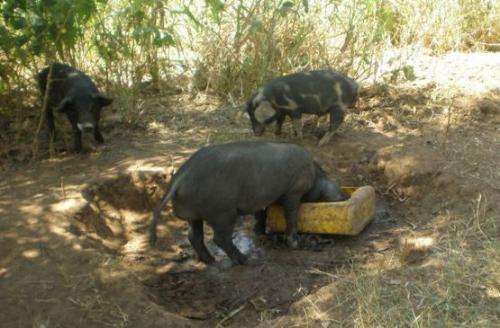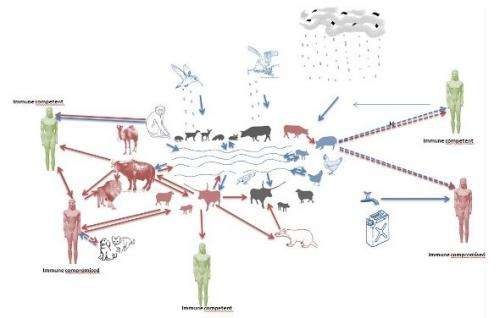Molecular epidemiological conditions relating to tuberculous and non-tuberculous mycobacteria

A research project has been studying the molecular epidemiological conditions relating to diseases caused by tuberculous and non-tuberculous mycobacteria in the Mubende region of Uganda.
This has increased our understanding of how the interplay between humans, animals and the environment affects the development of such diseases. The project focused in particular on social and risk factors which may possibly prevent the success of a disease control programme in the region.
The diseases concerned – for example tuberculosis in humans or cattle and other host-specific tuberculosis - are caused by pathogenic bacteria of the Mycobacterium tuberculosis complex (MTC). Non-tuberculous mycobacteria (NMT) have not been so frequently documented as pathogenic agents, but they occur widely in the environment. However, more advanced methods of diagnosis and the fact that immunodeficiency disorders such as HIV/AIDS are widespread have led to NTM now being associated with a broad range of diseases. These bacteria also sometimes occur in larger numbers than MTC in tuberculous lesions.

Adrian Muwonge's doctoral research has revealed a wide range of pathogenic and non-pathogenic mycobacteria in the environment of the Mubende region and this gives cause for concern, given the high occurrence of HIV amongst the local population. He has studied the role that non-tuberculous mycobacteria play in the establishment and development of disease, especially since these bacteria are resistant to anti-mycobacterial drugs.
Most of the isolated non-tuberculous mycobacteria come from drinking water and the soil, but animals also play an important role in the spreading of these bacteria in the environment. Humans are exposed to mycobacteria mostly via untreated drinking water from water sources that they share with domestic and/or wild animals.

Pig farming is widespread in Mubende and the pigs are usually kept in a "free-range" system, where they wander around in the surroundings in search of food. In this way, they become infected with mycobacteria from the soil and water while at the same time infecting the environment themselves. The local people eat a great deal of pork and the occurrence of pathogenic mycobacteria such as M. avium and M. bovis in slaughtered pigs is therefore a cause for concern. Mycobacterial infections are easiest to detect in checks carried out on meat, but the quality control procedures at the abattoirs in this region were found to be unsatisfactory.
A study of the occurrence of tuberculosis in humans in the region showed a high prevalence of tuberculosis, especially amongst those infected by HIV and amongst smokers who live in households of more than six persons. Multi-resistant tuberculous bacteria and high travel costs associated with medical treatment pose problems for the efforts being made to control these infections.
The large number of heterogeneous genotypes of M. tuberculosis in Mubende points to a dynamic and complex tuberculosis epidemiology in this area. Typically, tuberculosis patients were found to be infected with more than one strain of M. tuberculosis and this was particularly evident amongst female patients living in urban districts. The occurrence of specific variants of M. tuberculosis in certain geographic areas also indicates that the infection dynamics in urban areas differ from those in rural areas.
More information: Link to oral presentation: vimeo.com/51433750













